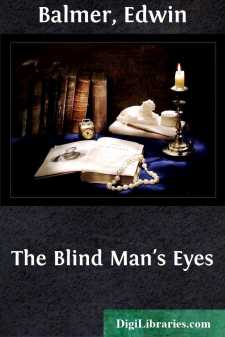Categories
- Antiques & Collectibles 13
- Architecture 36
- Art 48
- Bibles 22
- Biography & Autobiography 813
- Body, Mind & Spirit 142
- Business & Economics 28
- Children's Books 14
- Children's Fiction 11
- Computers 4
- Cooking 94
- Crafts & Hobbies 4
- Drama 346
- Education 46
- Family & Relationships 57
- Fiction 11829
- Games 19
- Gardening 17
- Health & Fitness 34
- History 1377
- House & Home 1
- Humor 147
- Juvenile Fiction 1873
- Juvenile Nonfiction 202
- Language Arts & Disciplines 88
- Law 16
- Literary Collections 686
- Literary Criticism 179
- Mathematics 13
- Medical 41
- Music 40
- Nature 179
- Non-Classifiable 1768
- Performing Arts 7
- Periodicals 1453
- Philosophy 64
- Photography 2
- Poetry 896
- Political Science 203
- Psychology 42
- Reference 154
- Religion 513
- Science 126
- Self-Help 84
- Social Science 81
- Sports & Recreation 34
- Study Aids 3
- Technology & Engineering 59
- Transportation 23
- Travel 463
- True Crime 29
The Blind Man's Eyes
by: Edwin Balmer
Description:
Excerpt
CHAPTER I
A FINANCIER DIES
Gabriel Warden—capitalist, railroad director, owner of mines and timber lands, at twenty a cow-puncher, at forty-eight one of the predominant men of the Northwest Coast—paced with quick, uneven steps the great wicker-furnished living room of his home just above Seattle on Puget Sound. Twice within ten minutes he had used the telephone in the hall to ask the same question and, apparently to receive the same reply—that the train from Vancouver, for which he had inquired, had come in and that the passengers had left the station.
It was not like Gabriel Warden to show nervousness of any sort; Kondo, the Japanese doorman, who therefore had found something strange in this telephoning, watched him through the portières which shut off the living-room from the hall. Three times Kondo saw him—big, uncouth in the careless fit of his clothes, powerful and impressive in his strength of feature and the carriage of his well-shaped head—go to the window and, watch in hand, stand staring out. It was a Sunday evening toward the end of February—cold, cloudy and with a chill wind driving over the city and across the Sound. Warden evidently saw no one as he gazed out into the murk; but each moment, Kondo observed, his nervousness increased. He turned suddenly and pressed the bell to call a servant. Kondo, retreating silently down the hall, advanced again and entered the room; he noticed then that Warden's hand, which was still holding the watch before him, was shaking.
"A young man who may, or may not, give a name, will ask for me in a few moments. He will say he called by appointment. Take him at once to my smoking-room, and I will see him there. I am going to Mrs. Warden's room now."
He went up the stairs, Kondo noticed, still absently holding his watch in his hand.
Warden controlled his nervousness before entering his wife's room,—where she had just finished dressing to go out,—so that she did not at first sense anything unusual. In fact, she talked with him casually for a moment or so before she even sent away her maid. He had promised a few days before to accompany her to a concert; she thought he had come simply to beg off. When they were alone, she suddenly saw that he had come to her to discuss some serious subject.
"Cora," he said, when he had closed the door after the maid, "I want your advice on a business question."
"A business question!" She was greatly surprised. She was a number of years younger than he; he was one of those men who believe all business matters should be kept from their wives.
"I mean it came to me through some business—discoveries."
"And you cannot decide it for yourself?"
"I had decided it." He looked again at his watch. "I had quite decided it; but now—It may lead to some result which I have suddenly felt that I haven't the right to decide entirely for myself."
Warden's wife for the first time felt alarmed. She could not well describe his manner; it did not suggest fear for himself; she could not imagine his feeling such fear; but she was frightened....



